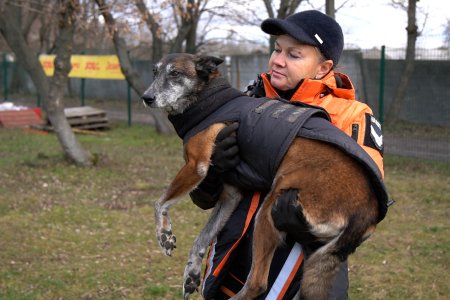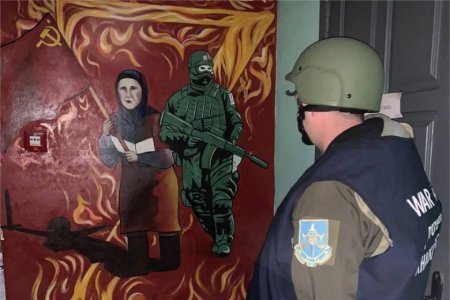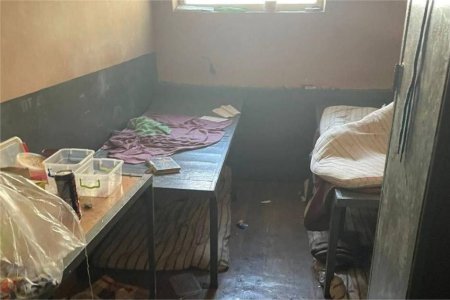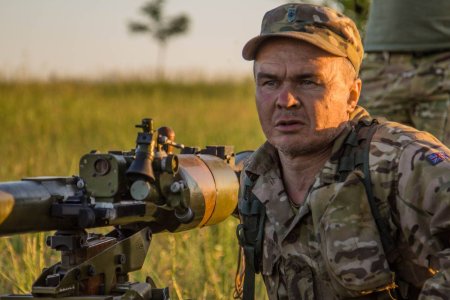Pavlo lived with his large family in an apartment on the left bank of Mariupol. The eldest daughter, Polina, is 18, the middle, Umila, is 13, and the youngest, Taras, is 10. An essential part of their family was an ordinary street tom cat named Gauguin. The children went to school, his wife Nadiia worked in production in the personnel department, and Pavlo worked as an engineer at the Azovstal plant. The work allowed him to care for his family, and Pavlo’s main passion was art. “I work at the factory for two days, and for two days I am an artist, I go to the workshop, I paint,” — the artist describes his life in this way. The disturbing news at the beginning of 2022 interfered with Pavlo’s usual life rhythm: factory — workshop — home. But he did not prepare for war or expect what would happen.
Tell me, how did you meet the 24 February?
On 24 February, I handed over the night shift at the factory. The shifters came at seven, saying they could hear the shooting in the street. It seemed to me that everything would be as before; they would shoot a little, and that would be the end. I went home and then to the workshop. I went to work at my workshop until 27 February, if my memory serves me right. Then, when the transport stopped, I had to stay overnight in the workshop and return home on foot.
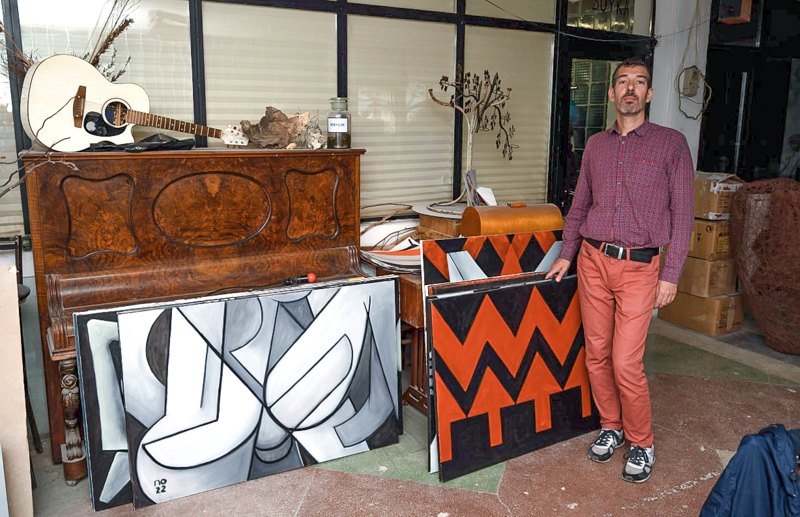
Tell me what happened on the left bank?
At the beginning of March, shots were already heard strongly, and there were hits in our area. People went in search of food, and there were long queues everywhere. There was still water and gas but no electricity. Maybe it was there on 3 March, I don’t remember well. The stores were still intact, and some even worked, but there were already problems with the delivery of products. One person could get one loaf of bread.
Then you found yourself in the central district?
A patrol police crew drove around the area and took away those who wished to evacuate. We agreed. We quickly gathered, and we had 10-15 minutes. We made two trips: I sent the children with my wife, and then I went. They brought us to the supermarket near the district administration. There was a bomb shelter nearby, and we stayed there for about two or three hours. There were many people; powerful shelling was heard around, and it was terrifying. And then the same police officers, but in big cars, took us to the center.
Where were you taken after that?
We were brought to the PSTU [Pryazovskyi State Technical University] hostel near the hospital “Adastra”. We were settled; the floor we had, it seems, was the last one. But we didn’t stay there long — not even an hour passed. We went upstairs, and there were huge old windows, and everything was shaking so much that one could expect the glass to fly into the room. It was very dangerous, so we turned around and went to my workshop.
Was the workshop adapted for life?
It was not adapted at all, but there was water. I put a sheet of plywood on the car tiers. In the workshop, there was also a folding bed and a rocking chair; somehow, we spent the night there. It was freezing, and it was not safe to cook food there at that time. We did not stay there, but I know later people lived in this workshop until April.
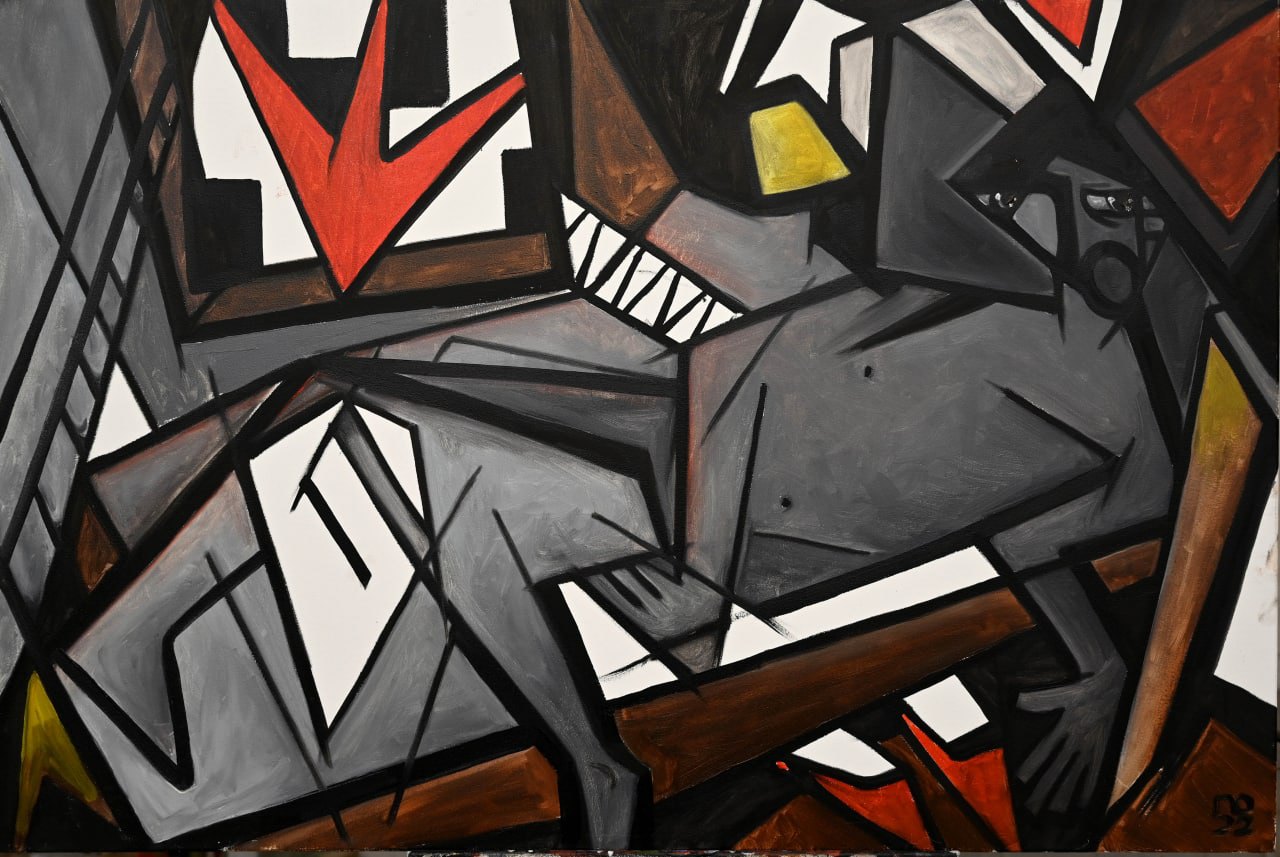
Where did you go after the workshop?
My wife’s relatives invited us to their place on Italiiska Street, where they have an old house with thick walls. We hid there. During the day, we did something upstairs and spent the night in the basement. I probably cooked so much food on an open fire that it would last the rest of my life.
Tell me, where did you get food and water?
Regarding water, we first went to the former DOSAAF [paramilitary sports organization in the Soviet Union]. There was a well. We had large 20-liter canisters. We took water there several times. Then, there was a rumor that it was shelled, and many died. After that, we went to the park in the City Garden. There, too, as it turned out, was a well. You had to stand for 40 minutes, maybe an hour, to get water. I saw wounded people in line. There was a long line, but the water there was good, and you could drink it. Industrial water was drained from the radiators. Once we drank melted water, it was collected in a teapot. It just snowed on the eighth of March or the ninth.
What did you eat, and where did you go for groceries?
We ate what we had time to collect in stores. Somewhere on 5 March, total looting began. Those who managed — scored. I did not participate in this, but I think it had to be done then because it was a matter of saving lives. If you can’t buy anything, there’s nothing anywhere, nothing works, then there is no other choice.
You said that you went to the Dzerkalnyi supermarket.
It was March 4 or 5, and there was a huge queue. I stood somewhere from 9 to noon. I bought a loaf of bread, some canned food, porridge. I brought half a package of food. It was all I managed to get because there were many people there, and they took everything, just grabbed what they could. It was the last day to buy anything. People tried to purchase something to the end. When the stores were opened, everyone stood in huge queues. After that, the looting began.
How many of you were in the shelter, and what did you do there?
There were about 20-30 people in our basement where we lived. The locals made makeshift benches and cots; they slept on what they had but not on the floor. Sometimes, right on the boards. It was cold; there was no heating, but it was much warmer in the basement than outside.
During the day, we played cards; someone even sketched or read something. By the way, I tried to do something too. Then I drew one picture, and that’s it; I was not up to drawing. During the day, sometimes you could go somewhere. I went to my godfather to see how they felt, if they were hurt if everything was in order. During the day, it was possible to unload the brain a little. Then, there were still attacks with periods of calm — not constant bombardment, but intermittent. And during these breaks, people came out of the cellars.
Tell me what the city looked like when you walked it?
It was already clear that the city was almost gone. Everything was destroyed. By the beginning of March, there were a lot of hits in the center. A third of the houses were demolished on the street where we hid. That is, it was clear that the city was simply destroyed.
What information did you have at that time? Did you understand what was happening?
There was no information at all. Everything was limited to hearsay. We deliberately went to the Drama Theater to talk to someone, to learn something. It was like an information crossroads. Everyone was waiting for the evacuation but in vain.

Were you also waiting for the evacuation?
Yes, we hoped too. We understood that many people remained in the city, and they needed to be taken out somehow. There were attempts; I even saw buses, but I don’t know if they took someone then or didn’t.
Can you talk about what happened to your brother and his family?
My brother died, according to the documents issued to the father. He died on 10 March with his family in the basement of his house — a direct hit from a projectile. Maybe from a tank, I don’t know. Right in the basement, everyone died together, with children and pets.
Tell me, how did you understand that people were starting to leave Mariupol, and how did you know you could try it, too?
On 15 March, my wife and I went to the Drama Theater to listen to what they were saying. The people stood with trunks at the entrance, waiting for the evacuation. According to rumors, it was supposed to take place. But I saw nothing of the kind happening. Then I saw people standing on the corner, and a car drove up. They got into it and left. So my wife and I realized that people drive their vehicles, and if they have free places, they take those who fit. I told my wife: “Quickly get ready, and we will leave somehow.” The night before, it felt like a tank was standing right over our heads firing. That day, the understanding came that you must run because it is becoming perilous. We quickly went to the basement, packed our bags, and said goodbye to our relatives. Then we came to the Drama Theatre. There were five of us. First, I sent my wife and kids.
Why did you send them separately?
Because it was impossible to find a car with five free seats. Also, we did not know where they were going: to Berdiansk or Zaporizhzhia. Therefore, I told my wife to go, and we will act according to the circumstances. Some man took my wife with small children along with his family. I was traveling with my eldest daughter and a cat in another car. I told my daughter we got into the car quickly: “What, 15 minutes have passed?” She said: “No, Dad, about an hour, even more.” Time seemed to converge into one point, and I did not notice it passing. It still seems to me that very little time has passed. I saw one scene at the Drama Theater, and I still remember it. Someone went, leaving a bag on the ground, a sports bag. There was a cat in the bag, meowing and crying. This someone was driving so fast that he left a family member behind.
There were phone connections outside the city, and getting through to each other was possible, so I met my family in Berdyansk.
How long were you in Berdiansk?
We were there for about a week. There were also rumors in Berdiansk that there would be an evacuation. And it was real. But I don’t know how many people were waiting for this evacuation. In the end, only five buses arrived, and there were about a thousand people, maybe two. Of course, not everyone got in. Later, local authorities or volunteers provided a sports complex so that one could wait there. In a room one and a half meters wide and about four meters long, the five of us stayed in that sports complex for three days. Volunteers brought canned food and dry bread. We ate that bread with tea for three days. It wasn’t easy to get bread in Berdiansk. There was also no cash, and ATMs did not work. We could only buy some kind of sausage a couple of times with a card.
Have you been waiting for your turn for a bus for three days?
There was a very long queue. Everyone climbed into these five buses; we also tried but could not. It seemed that my children could be crushed, and I barely got them out of the crowd. Then, there was some kind of self-organization, and lists were made. And so we waited for our turn for three days. The people realized that no one would go anywhere without registering and forming a queue. Therefore, they maintained at least some order. I remember there were 15 or 16 of these pieces of paper [lists]. Each sheet was for one bus.
There were 92 or 93 people on the bus, along with packages and bags. We were lucky; we did not stand but rode sitting — my wife and I, children in our arms, and a cat in an ATB basket. We sat down at about 11 am in Berdyansk and reached Zaporizhzhia at ten in the evening. We arrived at the Epicenter supermarket. A volunteer center was where people were received, fed, and taken to an overnight stay in Zaporizhzhia. While we were eating, the eldest complained that her stomach hurt. It turned out to be appendicitis. My wife and kids went to spend the night, and my eldest daughter and I went to the ninth clinical hospital. There, she underwent surgery. We stayed in Zaporizhzhia for about a week while we looked after our daughter.
Tell me, what happened to your house?
There is none, that’s all. In principle, there is no house; that area does not exist. There, the tractor went, razing everything to the ground. Our district no longer exists.
What about the prospects of returning to Mariupol?
What prospects could there be? I see no options and nowhere to return. If there was a place, then it is possible. After the city is liberated, maybe there will be something there. Of course, I missed the city: both the sea and the climate. I lived there all my life. I miss it very much.
